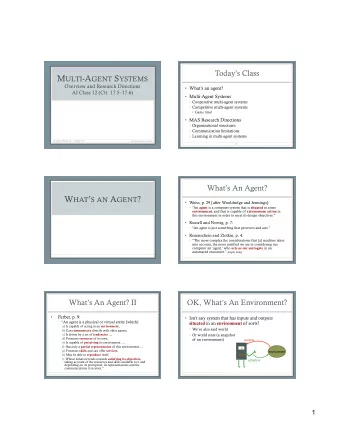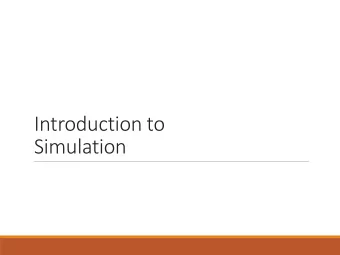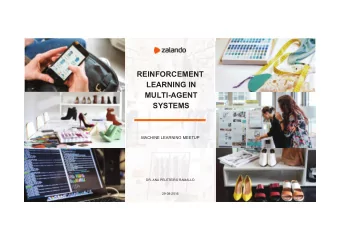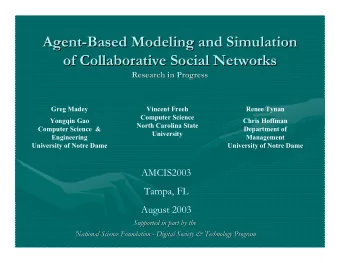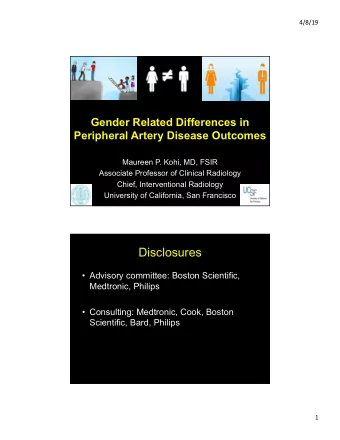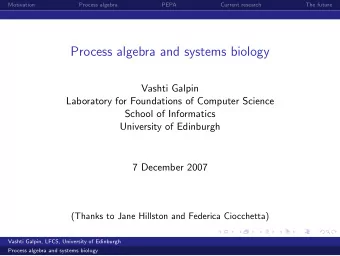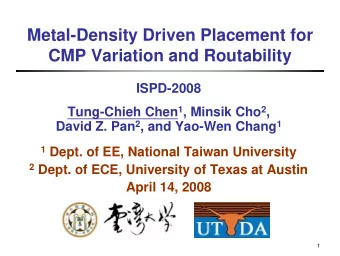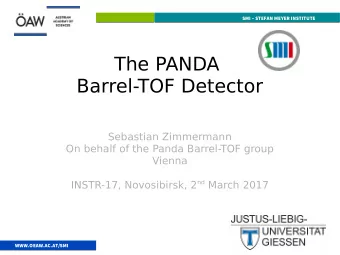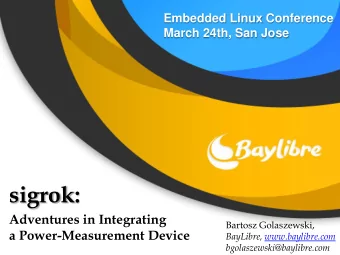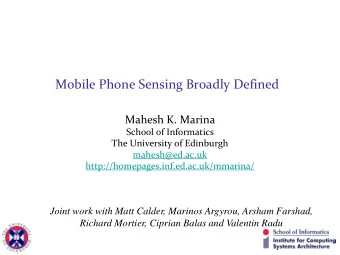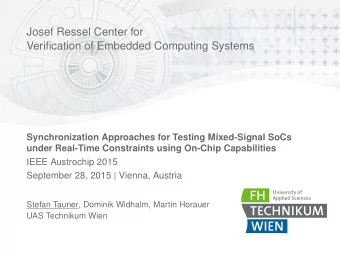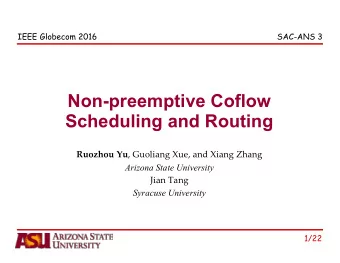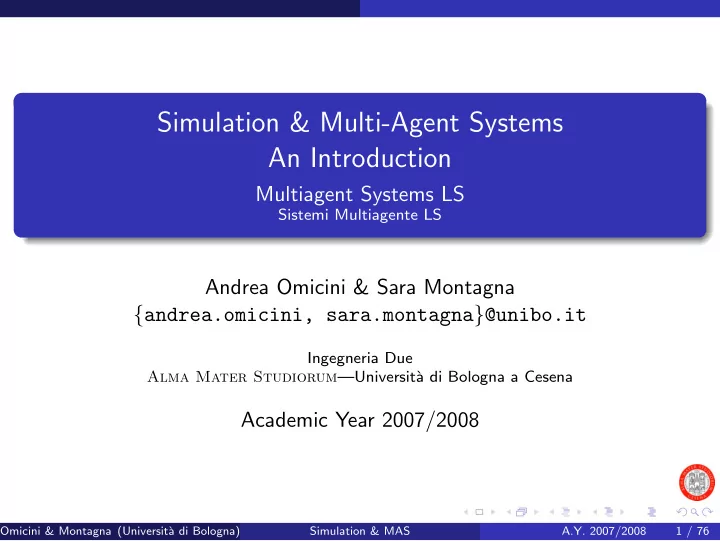
Simulation & Multi-Agent Systems An Introduction Multiagent - PowerPoint PPT Presentation
Simulation & Multi-Agent Systems An Introduction Multiagent Systems LS Sistemi Multiagente LS Andrea Omicini & Sara Montagna { andrea.omicini, sara.montagna } @unibo.it Ingegneria Due Alma Mater Studiorum Universit` a di Bologna a
Simulation & Multi-Agent Systems An Introduction Multiagent Systems LS Sistemi Multiagente LS Andrea Omicini & Sara Montagna { andrea.omicini, sara.montagna } @unibo.it Ingegneria Due Alma Mater Studiorum —Universit` a di Bologna a Cesena Academic Year 2007/2008 Omicini & Montagna (Universit` a di Bologna) Simulation & MAS A.Y. 2007/2008 1 / 76
Outline Simulation 1 Meaning Motivation Application Type of Simulation 2 Continue vs. Discrete Simulation Deterministic vs. Stochastic Micro, Macro and Multi-level Simulation A Methodology 3 Domain, Design, Computational Model Traditional Model and Simulation 4 Graphs and Networks Differential Equations: ODE, PDE, Master Equations Critical Analysis Computational Model 5 Agent Based Model and Multi-agent based Simulation Multi-agent based simulation Platforms Omicini & Montagna (Universit` a di Bologna) Simulation & MAS A.Y. 2007/2008 2 / 76
Simulation Meaning Outline Simulation 1 Meaning Motivation Application Type of Simulation 2 Continue vs. Discrete Simulation Deterministic vs. Stochastic Micro, Macro and Multi-level Simulation A Methodology 3 Domain, Design, Computational Model Traditional Model and Simulation 4 Graphs and Networks Differential Equations: ODE, PDE, Master Equations Critical Analysis Computational Model 5 Agent Based Model and Multi-agent based Simulation Multi-agent based simulation Platforms Omicini & Montagna (Universit` a di Bologna) Simulation & MAS A.Y. 2007/2008 3 / 76
Simulation Meaning Scientific Method Traditional science workflow [Parisi, 2001] Traditional scientific method identification of the phenomena of interest direct observation of the phenomena formulation of theories / working hypothesis reasoning on theories and phenomena through an empirical observation quantitative analysis: measuring of phenomena in laboratory under controlled conditions validation / invalidation of theories Omicini & Montagna (Universit` a di Bologna) Simulation & MAS A.Y. 2007/2008 4 / 76
Simulation Meaning Definition of Simulation A new way for describing scientific theories [Parisi, 2001] Simulation is the process with which we can study the dynamic evolution of a model system, usually through computational tools [Banks, 1999] Simulation is the imitation of the operation of a real-world process or system over time Omicini & Montagna (Universit` a di Bologna) Simulation & MAS A.Y. 2007/2008 5 / 76
Simulation Meaning Simulation Requires a Model M. Minsky – Models, Minds, Machines A model (M) for a system (S), and an experiment (E) is anything to which E can be applied in order to answer questions about S. A model is a representation / abstraction of an actual system A model is a formalisation of aspects of a real process that aims to precisely and usefully describe that real process A model involves aggregation, simplification and omission The model implements theories which have to be verified during the simulation Typical questions in model construction How complex should be the model? Which assumptions should be done? Omicini & Montagna (Universit` a di Bologna) Simulation & MAS A.Y. 2007/2008 6 / 76
Simulation Meaning Simulation Requires a Model M. Minsky – Models, Minds, Machines A model (M) for a system (S), and an experiment (E) is anything to which E can be applied in order to answer questions about S. A model is a representation / abstraction of an actual system A model is a formalisation of aspects of a real process that aims to precisely and usefully describe that real process A model involves aggregation, simplification and omission The model implements theories which have to be verified during the simulation Typical questions in model construction How complex should be the model? Which assumptions should be done? Omicini & Montagna (Universit` a di Bologna) Simulation & MAS A.Y. 2007/2008 6 / 76
Simulation Meaning From Model to Simulation. . . Computer simulation The models are designed to be run as processes within a computer The computational model simulates the processes as they are thought to exist in the real system Subsequent simulations imitate the operations of the modelled process generation of an artificial evolution of the system The observation of the evolution carries out deductions on the actual dynamics of the real system represented Simulation results make it possible to evaluate theories constructing the model Omicini & Montagna (Universit` a di Bologna) Simulation & MAS A.Y. 2007/2008 7 / 76
Simulation Meaning . . . and Back Model validation [Klugl and Norling, 2006] If the predicted and observed behaviour do not match, and the experimental data is considered reliable, the model must be revised Omicini & Montagna (Universit` a di Bologna) Simulation & MAS A.Y. 2007/2008 8 / 76
Simulation Meaning Simulation Creates a Virtual Laboratory A virtual laboratory makes it possible to perform experiments virtual phenomena observed under controlled conditions possibility to easily modify the components of an experiment (variables, parameters, simulations’ part) tools to make predictions on theories tools to make inferences on simulation results Omicini & Montagna (Universit` a di Bologna) Simulation & MAS A.Y. 2007/2008 9 / 76
Simulation Motivation Outline Simulation 1 Meaning Motivation Application Type of Simulation 2 Continue vs. Discrete Simulation Deterministic vs. Stochastic Micro, Macro and Multi-level Simulation A Methodology 3 Domain, Design, Computational Model Traditional Model and Simulation 4 Graphs and Networks Differential Equations: ODE, PDE, Master Equations Critical Analysis Computational Model 5 Agent Based Model and Multi-agent based Simulation Multi-agent based simulation Platforms Omicini & Montagna (Universit` a di Bologna) Simulation & MAS A.Y. 2007/2008 10 / 76
Simulation Motivation Why Do We Need Simulations? [Parisi, 2001],[Klugl and Norling, 2006] The simulated system cannot actually be observed for either ethical or practical reasons The time scale of the real system is too small or too large for observation The original system is not existing anymore or not yet The system is complex simple pattern of repeated individual action can lead to extremely complex overall behaviour impossible to predict a-priori the evolution of the system Omicini & Montagna (Universit` a di Bologna) Simulation & MAS A.Y. 2007/2008 11 / 76
Simulation Motivation What Simulations Are Used For? Making prediction (look into the future) to be tested by experiments Exploring questions that are not amenable to experimental inquiry Obtaining a better understanding of some features of the system Describing and analysing the behaviour of a system, asking “what if” questions about real system rapidly analysing the effects of manipulating experimental conditions without having to perform complex experiments Potentially assisting in discovery and formalisation Verifying hypothesis and theories underlying the model that try to explain the systems behaviour Omicini & Montagna (Universit` a di Bologna) Simulation & MAS A.Y. 2007/2008 12 / 76
Simulation Motivation A Science for Simulation Popper (1972) Popper proposes as a logical necessity that scientific theories can only be refuted no amount of supporting experimental evidence constitutes proof of a theory yet a single repeatable piece of counter-evidence can require that the theory is developed or replaced Scientific hypothesis should consist only of refutable statements Simulation can be used as a tool to validate, or better, potentially refute formal models Omicini & Montagna (Universit` a di Bologna) Simulation & MAS A.Y. 2007/2008 13 / 76
Simulation Motivation A Science for Simulation Popper (1972) Popper proposes as a logical necessity that scientific theories can only be refuted no amount of supporting experimental evidence constitutes proof of a theory yet a single repeatable piece of counter-evidence can require that the theory is developed or replaced Scientific hypothesis should consist only of refutable statements Simulation can be used as a tool to validate, or better, potentially refute formal models Omicini & Montagna (Universit` a di Bologna) Simulation & MAS A.Y. 2007/2008 13 / 76
Simulation Application Outline Simulation 1 Meaning Motivation Application Type of Simulation 2 Continue vs. Discrete Simulation Deterministic vs. Stochastic Micro, Macro and Multi-level Simulation A Methodology 3 Domain, Design, Computational Model Traditional Model and Simulation 4 Graphs and Networks Differential Equations: ODE, PDE, Master Equations Critical Analysis Computational Model 5 Agent Based Model and Multi-agent based Simulation Multi-agent based simulation Platforms Omicini & Montagna (Universit` a di Bologna) Simulation & MAS A.Y. 2007/2008 14 / 76
Simulation Application Applications of Simulation Main applicative domains Interdisciplinary domain Complex Dynamical Systems systems too complex to be understood from observations and experiments alone Predicting changes Observing systems evolution Omicini & Montagna (Universit` a di Bologna) Simulation & MAS A.Y. 2007/2008 15 / 76
Recommend
More recommend
Explore More Topics
Stay informed with curated content and fresh updates.
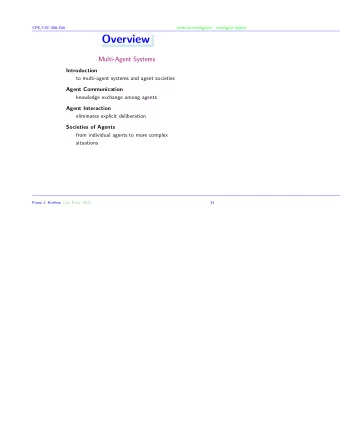
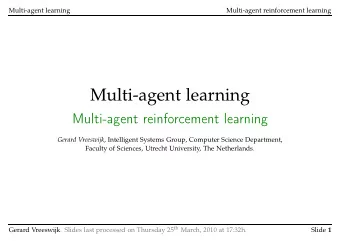
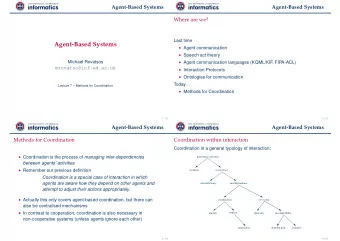


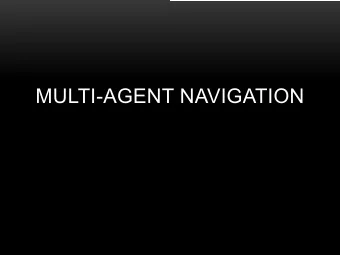
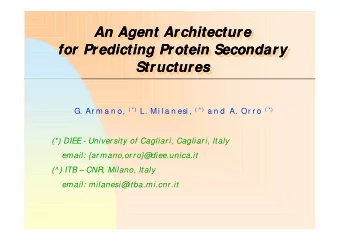
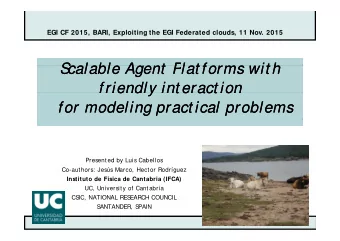
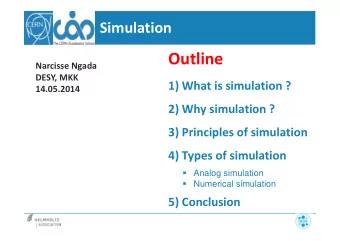
![W HAT S AN A GENT ? Weiss, p. 29 [after Wooldridge and Jennings]: An agent is a](https://c.sambuz.com/792239/w-hat-s-an-a-gent-s.webp)
